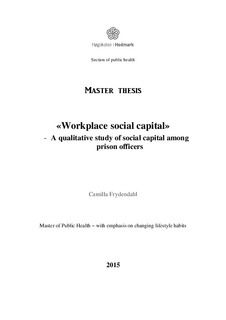| dc.description.abstract | English abstract: Title: “Workplace Social capital” – A qualitative study of social capital among prison officers.
Background: The background for the project was a personal wish to develop a deeper understanding of the factors of inter-human relations that can provide benefits to the public health, with a specific focus on occupational health.
Aim: This project aims to explore how social capital might function to prevent stress in the work environment of prison officers. This study will contribute to a better understanding of the challenges that prison officers face in their daily work. It seeks to explore the triggering elements of stress and stressors potentially health damaging, coping –mechanisms and resources that employees possess, and strategies being used to decrease stress-levels in the workplace.
Theory: The concept of social capital has informed the study in terms of an active use of its underlying complex theories that treats the public health issue discussed, and following brought forward implications to the research question. In this study, Bourdieu, Coleman, Putnam and Portes are the central theorists. Their definitions of the concept provides the basis for interpretation and understanding of the phenomenon that seeks exploration. Social capital is the amount of resources that inheres within a group or network that members can actively use, exchange and benefit from.
Method: The method is based on qualitative research, conducted as semi-structured interviews with eight prison officers currently working at an open prison. The Phenomenological hermeneutics is the overall research strategy, where the researcher has explored the participants’ experiences of stress and coping-mechanisms in a work environmental context of prison officers. The analysis follows Giorgi’s principles of Systematic Text condensation (STC), which is modified by K. Malterud.
Results/ conclusion: Social capital has a stress-preventive effect in prison officers in terms of a common set of shared values and norms, trust, and reciprocal relationships with colleagues in the prison workplace. These factors underpins the social support, which represents a significant role towards the social cohesion that is present within the daily work and work environment of prison officers. It makes them better equipped to deal with the challenging work tasks, and prevent effects from work environmental stressors. Social capital based on reciprocal relationships and support from the inmates are additional sources to prevent stress in employees at the prison facility. | nb_NO |
